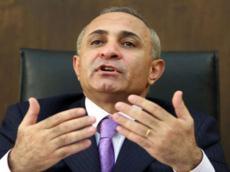|
|
TODAY.AZ / Politics
Villain leader Abrahamyan
14 April 2015 [12:30] - TODAY.AZ

By Mushvig Mehdiyev
Armenia's prime minister celebrates the first anniversary of his term in office on April 13 following one of the most "turbulent years" in the history of Armenia.
Hovik Abrahamyan's appointment as prime minister triggered hopes at the time that Armenia's ailing economy would finally stand on its own two feet and avoid going further down into the black abyss.
However, such hopes were kicked to the curb after statistical data proved the Premier's failure to lead the country to a safer economic zone.
Local media wrote that the year-end economic indices proved an unchanged economic situation in Armenia since Abrahamyan's appointment last April. Zoghovurd newspaper in Yerevan reported that over the year of his premiership Abrahamyan couldn't achieve any positive results in terms of economic revival.
The economy failed to revert to a higher growth trajectory amid a year-long failure of Abrahamyan, reminding all that the PM appears as useless as his predecessor, Tigran Sargsyan, in fulfilling his promises to the nation.
The Premier followed the same destructive path, dashing Armenians' hopes of a better, safer tomorrow, read the newspaper.
More than a year ago, on April 3, 2014, Sargsyan resigned from the PM post, reportedly for "personal reasons". Now, he is serving as Armenia's ambassador to the U.S. Abrahamyan filled his empty shoes with a full plate of plans and measures to remedy the crisis-hit economy.
But, the reflection of Abrahamyan's activity through statistical numbers proved his measures were unproductive and left room for doubt on his "failure policy".
Let's begin with emigration. Over 47,000 people have left Armenia over the last year against 42,000 emigrants registered in 2013.
Armenia's exports accounted for $218 million in 2013 against $163 million under Abrahamyan's premiership. In addition, Armenia's foreign currency reserves fell to $1.49 billion on April 1 this year from $1.97 billion registered on the same date last year.
Since Armenia very heavily depends on Russia economically, the country found itself in a very difficult situation over the past year after Moscow was slammed with a series of sanctions from the EU and the U.S.
The national currency, the dram, hit a record low, exports fell by almost 90 percent and price hike saw a surge by 5.1 percent. The banking sector announced forcible mergers and closures and industry leaders warned of a coming global meltdown.
All the aforementioned should be enough to project the kind of Armenia Abrahamyan's year-long term in office delivered, experts said.
Even Abrahamyan's "unexpected" visits to Yerevan's supermarkets last December failed to impact inflation, especially since market prices remain in the hands of the oligarchs.
According to a survey conducted by a local TV channel in Yeravan earlier this month, the majority of Yerevan residents said they felt uncomfortable and dissatisfied with Abrahamyan's term in office, since no tangible result was ever witnessed on the ground in terms of social improvements.
Residents claimed that since Sargsyan's resignation nothing really changed - it's the same song and the same dance. Drawing a parallel between Abrahamyan and Sargsyan, residents said that both politicians have failed to make any significant contributions to Armenia's economy and politics.
While Abrahamyan's cabinet predicted a 4.1 percent economic growth in Armenia this year, World Bank report sharply contradicted Yerevan's dreamland views, stressing that at best Armenia will register as 0.8 percent economic rise. WB official, Lora Bailey urged the authorities to review their unrealistic forecasts.
URL: http://www.today.az/news/politics/139836.html
 Print version
Print version
Connect with us. Get latest news and updates.
See Also
- 02 January 2026 [10:28]
President Ilham Aliyev expresses condolences to President of Swiss Confederation - 01 January 2026 [18:21]
New Year’s table set at social service institution for elderly people - 01 January 2026 [12:41]
President Ilham Aliyev sends congratulatory letter to Cuban President - 01 January 2026 [12:30]
President Ilham Aliyev sends congratulatory letter to President of Sudan's Transitional Sovereignty Council - 01 January 2026 [00:10]
Azerbaijan’s Armed Forces significantly strengthened over past five years - President - 31 December 2025 [12:12]
Five years of reliable partnership - Azerbaijani gas as a pillar of EU energy security - 30 December 2025 [18:06]
State support expands access to electricity networks in liberated areas - 30 December 2025 [12:41]
Azerbaijan ratifies visa-free regime with Somalia for diplomatic passport holders - 30 December 2025 [12:12]
Disinformation Alert: Addressing False Reports of “Burning” Houses in Karabakh - 30 December 2025 [11:11]
Test of time: Karabakh showed who came to create
Most Popular
 Five years of reliable partnership - Azerbaijani gas as a pillar of EU energy security
Five years of reliable partnership - Azerbaijani gas as a pillar of EU energy security
 Gulf nations offer support for Yemen’s government and Saudi security
Gulf nations offer support for Yemen’s government and Saudi security
 Netherlands Embassy in Baku congratulates Azerbaijan on Solidarity Day and New Year
Netherlands Embassy in Baku congratulates Azerbaijan on Solidarity Day and New Year
 Why Fico’s EU critique reflects Slovak politics more than European reality
Why Fico’s EU critique reflects Slovak politics more than European reality
 Porsche recalls cars over camera issue
Porsche recalls cars over camera issue
 Georgia eyes Baku–Tbilisi–Kars rail finish in 2026 push
Georgia eyes Baku–Tbilisi–Kars rail finish in 2026 push
 China unveils 2026 subsidy scheme for home appliance trade-ins
China unveils 2026 subsidy scheme for home appliance trade-ins
